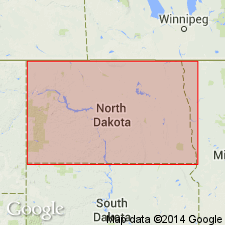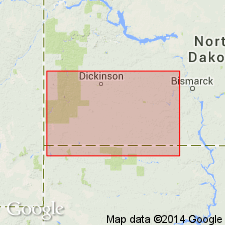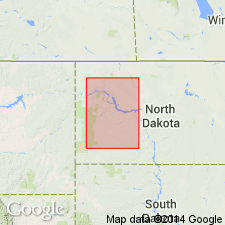
- Usage in publication:
-
- Sentinel Butte Formation
- Modifications:
-
- Overview
- AAPG geologic province:
-
- Williston basin
Summary:
Type section is designated on northeast flank of Sentinel Butte, NW1/4 SE1/4 sec 5, T139N, R104W, Golden Valley Co, ND in Williston basin. Section is 368 ft of poorly consolidated heterogeneous sedimentary rocks: 9 percent lignite, 10 percent sand, 10 percent silty sand, 18 percent sandy silt, 25 percent silt, 23 percent clayey silt, and nil clay. Use of term "shale" is discouraged as a misnomer. Thick, basal, silty sand unit conformably overlies HT Butte lignite of Tongue River Formation. Upper beds of Sentinel Butte are illite, highly weathered to bright colors as a late Eocene paleosol, and disconformably overlain by thick sandstone of White River Group. Age given as Paleocene.
Source: GNU records (USGS DDS-6; Denver GNULEX).

- Usage in publication:
-
- Sentinel Butte Formation
- Modifications:
-
- Contact revised
- AAPG geologic province:
-
- Williston basin
Summary:
Lower contact revised in that Sentinel Butte Formation of the Fort Union Group overlies the newly named Bullion Creek Formation in western ND in the Williston basin. Name Bullion Creek replaces use of Tongue River Formation in this area. Nomenclature chart.
Source: GNU records (USGS DDS-6; Denver GNULEX).

- Usage in publication:
-
- Sentinel Butte Member
- Modifications:
-
- Revised
- AAPG geologic province:
-
- Williston basin
Summary:
In western North Dakota (Williston basin), upper contact of the Paleocene Sentinel Butte Member of the Fort Union Formation is revised. Unconformably underlies the newly named Bear Den Member of Golden Valley Formation (called "lower member" in previous reports). Fort Union Formation distinguished from the Bear Den Member by its darker colors (dark gray, brown), abundance of lignite, rarity of kaolinite, abundant petrified wood, numerous siderite concretion zones, predominance of illite and montmorillonite, and in the northwest part of the area, the presence of extensive blue-gray bentonite beds. Age is Paleocene (early Clarkforkian, early Thanetian). On accompanying geologic map, Fort Union Formation (mapped undivided) is about 500 m thick. Report includes correlation chart, cross section, geologic map.
Source: Modified from GNU records (USGS DDS-6; Denver GNULEX).
For more information, please contact Nancy Stamm, Geologic Names Committee Secretary.
Asterisk (*) indicates published by U.S. Geological Survey authors.
"No current usage" (†) implies that a name has been abandoned or has fallen into disuse. Former usage and, if known, replacement name given in parentheses ( ).
Slash (/) indicates name conflicts with nomenclatural guidelines (CSN, 1933; ACSN, 1961, 1970; NACSN, 1983, 2005, 2021). May be explained within brackets ([ ]).

